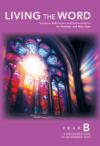Scripture Study for
Immaculate Conception of the Blessed Virgin Mary
Genesis 3:9–15, 20 / Psalm 98:1a / Ephesians 1:3–6, 11–12 / Luke 1:26–38
<< Back to LECTIONARY RESOURCES
Understanding the Word
By Br. John R. Barker, OFM
The story of Eden describes an idyllic past marked by divine-human intimacy, which was destroyed when the snake suggested that God, jealous of divine prerogatives, did not have the humans’ best interests at heart. The result, as later chapters make clear, was a breakdown of the divine-human relationship as well as relationships between humans. God’s judgment on the snake, read on one level, explains why snakes are dangerous and why humans try to crush their heads rather than be bitten. But the story calls for a symbolic reading, in which the snake represents temptation, and thus the enmity between humans and the snake represents the constant and universal struggle to trust and obey God.
The reading from Ephesians focuses on divine election apart from human merit. Paul emphasizes that this election results in “blessing” from God in Christ, which takes different forms. One is holiness, perfect conformity to the will of God, “without blemish.” Another is adoption into the household of God, not having earned this as a right, but receiving it as a gift, “in accord with the favor of his will.” Those in God’s household achieve their salvation because this is God’s will, and this is therefore cause for praise and glory. The Gospel scene is filled with references to God’s earlier work, suggesting that Gabriel is announcing the culmination of a plan long in the making. References to David point toward the divine election of that king and his descendants, whose rule over Israel God promised to be “firmly established forever” (2 Samuel 7:16). The child who will fulfill this promise forever is to be born to Mary, who has found favor with God and so is prepared to be the mother of “the Son of God.” Mary, of course, is perplexed by how all this can be. Gabriel’s explanation itself might seem incredible, until he also announces that the aged and barren Elizabeth will also give birth, pointedly noting that “nothing will be impossible with God.”
